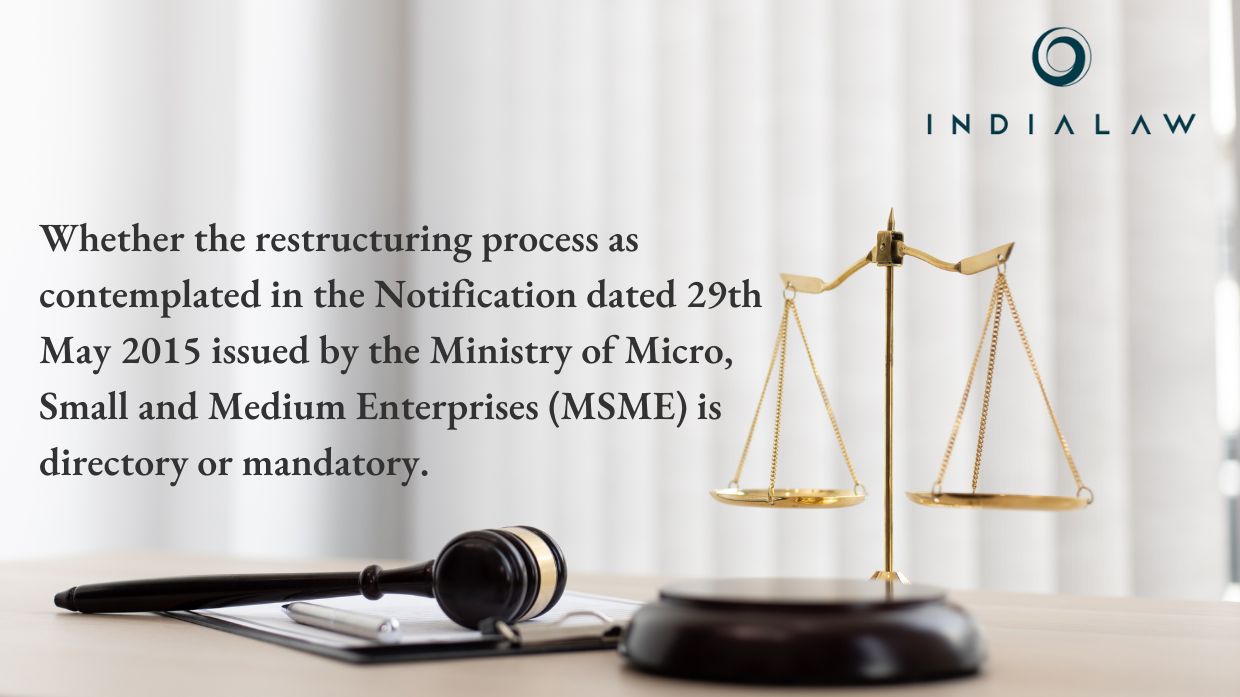Whether the restructuring process as contemplated in the Notification dated 29th May 2015 issued by the Ministry of Micro, Small and Medium Enterprises (MSME) is directory or mandatory.

Introduction
The Hon’ble Supreme Court of India, in a recent landmark decision passed vide Order dated 01.08.2024 in the matter of Pro Knits v. Board of Directors of Canara Bank[i], addressed a crucial issue regarding the application and enforceability of a notification dated 29.05.2015 which was titled “Framework for Revival and Rehabilitation of MSMES”. This notification, which was issued by the Ministry of Micro, Small and Medium Enterprises (MSME), laid down the framework for revival, rehabilitation, promotion and further development of stressed MSMEs. The core issue revolved around the question, whether banks and Non- Banking Financial Companies (NBFCs) are obligated to follow the restructuring process as laid down in the notification before classifying a loan account as a Non- Performing Asset (NPA) and initiating recovery proceedings under the relevant provisions of the Securitization and Reconstruction of Financial Assets and Enforcement of Security Interest Act, 2002 (SARFAESI Act).
Brief Facts And Contentions Of Both The Parties
The MSME’s who were the Appellants in this case challenged the actions undertaken by banks and NBFCs to classify the loan accounts as Non-Performing Assets and initiating recovery proceedings under SARFAESI Act.
The Advocate for the Appellant contended that the banks and NBFC’s who were the respondents, failed to adhere to the restructuring procedures as laid down in the 2015 Notification before classifying their loan accounts as NPAs. It was further contended that the respondents were required to follow the procedure as laid down in the notification dated 29th May 2015, which included, identifying incipient stress in the accounts of MSMEs and exploring restructuring options before resorting to action under the SARFAESI Act for initiating recovery proceedings.
The Hon’ble Bombay High Court while addressing this issue earlier had dismissed the writ petitions filed by the appellants, and was of the view that the banks and NBFCs were not obliged in any way to follow the restructuring framework as prescribed in the notification and did not consider it to be mandatory and binding. The High Court was also of the opinion that the provisions contained in the SARFAESI Act overrides the provisions as laid down in other acts as well as the MSMED Act as per Section 35 of the SARFAESI act.
The Respondents while being in agreement with the judgement of the Bombay High Court were also of the contention that the concerned appellants had not applied to the respondents to avail the benefit of the said notification at the relevant time and that the respondents thus initiated the recovery proceedings after following the due process of law.
The Apex court was thus tasked with determining whether the 2015 Notification and subsequent directions issued by the Reserve Bank of India (RBI) mandated adherence by banks and NBFC’s, or if such guidelines were merely directory and not mandatory.
Analysis Of The Decision
The Supreme Court’s decision was based on the statutory interplay between the MSMED Act, the SARFAESI Act, the Banking Regulation Act, 1949 and other relevant provisions.
The Apex Court was of the view that the 2015 Notification, issued in exercise of powers conferred under Section 9 of the MSMED Act, had statutory force and was binding. The Notification was designed to facilitate the promotion and development of MSMEs and included mandatory procedures for identifying and managing stressed accounts. The Supreme Court further observed that, the RBI’s revised Framework and Directions issued by it in exercise of powers conferred by Section 21 and 35 (A) of the Banking Regulation Act further reinforced the mandatory nature of these procedures, making them binding on all scheduled commercial banks.
The Respondents argued that SARFAESI Act, which provides for the enforcement of security interests and recovery of debts, would prevail over the provisions as laid down in the MSMED Act. However, the Supreme Court clarified that while the SARFAESI Act does in fact lay down provisions for recovery proceedings to be initiated, it does not eliminate the requirement to follow the restructuring procedures as prescribed by the notification issued under the MSMED act and the subsequent directions issued by the Reserve Bank of India before classifying loan accounts as NPA’s.
The Court also put emphasis on the fact that the MSME’s cannot escape responsibility under the framework as prescribed in the Notification. They must proactively inform banks of their status and it is incumbent on part of the concerned MSME to produce relevant and verifiable documents to avail themselves of the benefits under the framework. The SC also further stated that failure to do so would entail the secured creditors to take recourse under the relevant provisions of the SARFAESI Act for enforcement of security interest.
The Apex Court rejected the High Court’s finding that the restructuring framework as prescribed in the Notification dated 29th May, 2015 was not mandatory or binding on the Respondents. It reaffirmed that the procedural steps as mentioned in the Notification must be followed before classifying an MSME account as Non-Performing Asset.
Conclusion
The Supreme Court’s judgment in this case marks a significant point in the enforcement of the framework for revival, rehabilitation, promotion and development of MSME’s as prescribed in the notification dated 29th May 2015. By re-affirming that the notification and subsequent RBI
directions were indeed mandatory and binding, the Court has reinforced the importance of procedural safeguards intended to protect, develop and enhance competitiveness of MSME’S.
[i] 2024 SCC OnLine SC 1864
By entering the email address you agree to our Privacy Policy.



